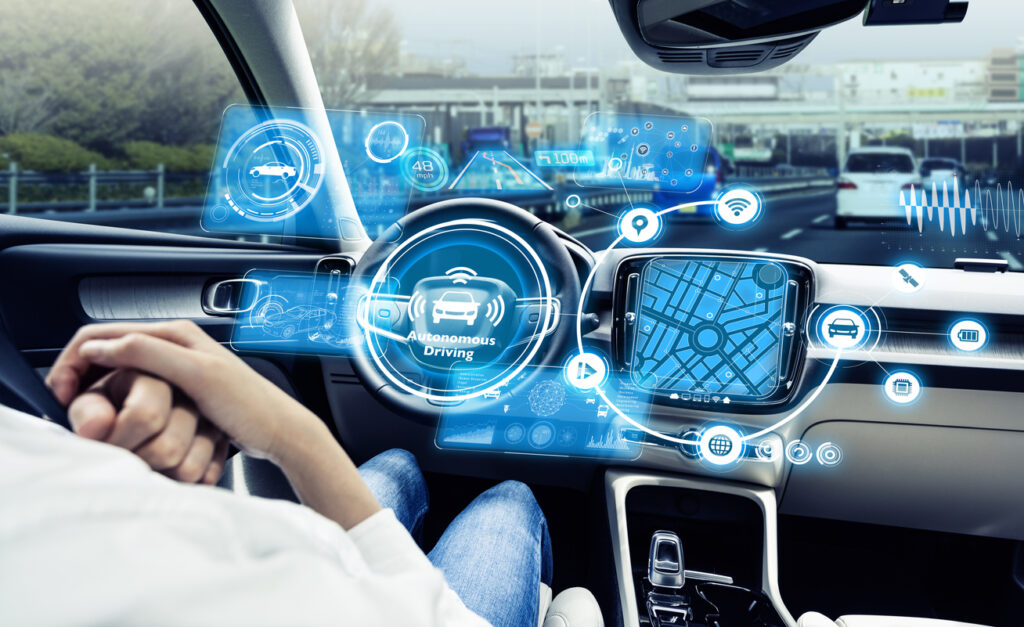The rapid advancement of artificial intelligence (AI) is transforming various industries, and the automotive sector is no exception. AI-powered vehicles, commonly referred to as intelligent or autonomous vehicles, represent a monumental shift in how cars are designed, operated, and perceived. These vehicles are no longer just modes of transportation; they are complex systems that harness the power of AI to navigate roads, analyze data, and improve overall safety. As AI continues to evolve, its role in the automotive industry will only become more significant, offering a glimpse into the future of driving.
The Rise of AI in the Automotive Industry
Artificial intelligence has become a driving force behind many modern innovations, and its application in the automotive industry is revolutionizing how vehicles operate. Traditionally, vehicles relied on human input for navigation and decision-making, but AI-powered cars can now make real-time decisions without human intervention. The integration of machine learning algorithms, computer vision, and advanced sensors allows vehicles to assess their environment and respond to various driving conditions.
The most significant development in this field has been the introduction of autonomous or self-driving cars. These vehicles use AI systems to process information from cameras, radar, and lidar sensors to map out their surroundings and make driving decisions. From avoiding obstacles to following traffic signals, AI has enabled vehicles to navigate roads with minimal or no human control. While fully autonomous cars are still in the testing phase, semi-autonomous features such as adaptive cruise control, lane-keeping assistance, and automatic emergency braking are already available in many modern vehicles.
Enhancing Road Safety with AI
One of the most promising aspects of AI-powered vehicles is their potential to significantly enhance road safety. Human error is one of the leading causes of traffic accidents worldwide, with distractions, fatigue, and impaired judgment often contributing to collisions. AI-driven systems have the ability to reduce these risks by continuously monitoring the vehicle’s surroundings, assessing potential hazards, and reacting faster than a human driver could.
For example, AI can process data from sensors to detect pedestrians, cyclists, and other vehicles, even in challenging weather conditions or low visibility. This ability to “see” beyond human capabilities allows AI-powered vehicles to take preemptive actions, such as slowing down or swerving to avoid an accident. Additionally, AI systems are not susceptible to distractions, meaning they can maintain focus on the road at all times, thereby reducing the likelihood of accidents caused by human error.
Another critical safety feature of AI-powered vehicles is their ability to communicate with other vehicles and infrastructure. Vehicle-to-vehicle (V2V) and vehicle-to-everything (V2X) communication systems enable cars to share real-time information about traffic conditions, road hazards, and other safety-related data. This interconnectedness allows vehicles to anticipate and respond to potential dangers, improving overall road safety for all users.
AI’s Role in Fuel Efficiency and Environmental Impact
Beyond safety, AI is playing a significant role in improving fuel efficiency and reducing the environmental impact of vehicles. With growing concerns about climate change and the depletion of fossil fuels, the automotive industry is increasingly looking to AI to optimize fuel consumption and promote greener driving practices.
AI-powered vehicles can analyze driving patterns, road conditions, and traffic data to adjust fuel usage in real time. By optimizing engine performance and minimizing unnecessary fuel consumption, AI helps vehicles achieve better mileage while reducing emissions. Some AI systems can even suggest more efficient routes that avoid traffic congestion, further reducing fuel consumption and lowering carbon footprints.
In addition to optimizing fuel efficiency, AI is contributing to the development of electric vehicles (EVs). Intelligent energy management systems within EVs allow for more effective battery usage and charging, extending the range of the vehicle and improving its overall performance. AI is also being used to predict when and where EVs will need charging, making the charging infrastructure more accessible and efficient for users.
The Impact on Driving Experience and Convenience
AI-powered vehicles are not only improving safety and efficiency but also transforming the overall driving experience. By automating routine tasks such as parking, lane changes, and braking, AI allows drivers to focus more on the journey itself, offering a more relaxed and enjoyable driving experience. Features like voice-activated controls and intelligent infotainment systems allow drivers to interact with their vehicles in a more intuitive and user-friendly manner.
In the realm of convenience, AI is paving the way for mobility services such as ride-sharing and autonomous taxis. These services, powered by AI, provide passengers with a more seamless and efficient way to travel, reducing the need for private vehicle ownership. As cities become more congested, AI-powered transportation services offer a solution to traffic problems by optimizing routes and improving the flow of vehicles through urban areas.
Additionally, AI is enabling predictive maintenance, where vehicles can monitor their own health and alert drivers when parts need replacement or repairs. By analyzing data from sensors, AI can detect potential issues before they become serious problems, reducing downtime and maintenance costs for vehicle owners. This shift towards proactive vehicle care ensures that cars remain in optimal condition, enhancing the longevity of the vehicle and reducing the risk of unexpected breakdowns.
The Role of Junkyards in Supporting AI-powered Vehicle Development
As AI-powered vehicles gain prominence, the automotive industry is rapidly evolving, and even the junkyard industry plays a key role in this transformation. With services like cash for cars or free car removal in Sydney, junkyards are instrumental in recycling outdated vehicle models, providing raw materials, and salvaging essential components. These parts can be repurposed or recycled, aiding manufacturers in developing advanced AI-powered vehicles more sustainably. This connection between the junkyard industry and innovation demonstrates how recycling older vehicles supports the continuous advancement of automotive intelligence.
Challenges and Ethical Considerations
While AI-powered vehicles offer numerous benefits, they also present several challenges and ethical considerations that must be addressed. One of the primary concerns is the issue of data privacy. AI systems rely on vast amounts of data to function, including personal information about drivers and their habits. Ensuring that this data is collected, stored, and used responsibly is crucial to maintaining trust in AI-driven technologies.
There are also ethical dilemmas related to autonomous driving, particularly when it comes to decision-making in life-and-death situations. For example, how should an autonomous vehicle react if it is faced with a scenario where it must choose between two unavoidable accidents? These moral questions highlight the need for clear regulations and guidelines to govern the behavior of AI-powered vehicles.
Another challenge is the potential loss of jobs in the transportation sector. As AI-driven technologies become more widespread, roles such as truck drivers, taxi drivers, and delivery personnel may be at risk of automation. While AI presents opportunities for new types of jobs, the transition could have significant social and economic implications.
Also visit:https://totalcarremoval.com.au/car-removal-castle-hill/
Conclusion
AI-powered vehicles are undoubtedly driving the future of automotive intelligence, offering safer, more efficient, and more convenient transportation solutions. From enhancing road safety to improving fuel efficiency and transforming the driving experience, AI is revolutionizing the automotive industry in ways that were once thought impossible. While there are challenges to overcome, including ethical concerns and data privacy, the potential benefits of AI-driven vehicles are vast. As technology continues to evolve, AI will play an increasingly prominent role in shaping the future of transportation, paving the way for smarter, safer, and more sustainable mobility solutions for everyone.
Discover related articles on our blog.



